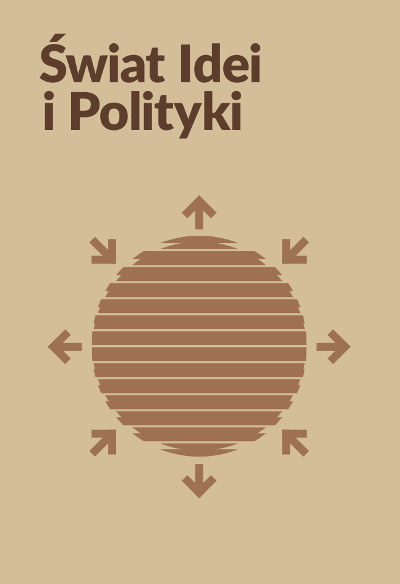Social issues in neo-agrarianism – case study of the Polish People’s Party
DOI:
https://doi.org/10.34767/SIIP.2024.01.01Keywords:
political thought, social policy, axiology, practice, solidarity, program, common goodAbstract
Political thought is a sub-discipline of political science, somewhat on the sidelines and less exposed. However, this is an area where we are constantly finding new threads to explore and describe. The purpose of the article is to reconstruct modern agrarian thought, in relation to social policy issues. The political en vironment associated with the Polish People’s Party (Polskie Stronnictwo Ludowe – PSL) is an active participant in political life, and as a result creates many documents for the use of this activity. However, this is not a strand of political thought in which we find theoretical considerations that have no connection to social practice. The analysed documents exemplify a practical approach to social reality. The purpose of the article is to show the peculiarities of this current of social and political thought, resulting from its roots in the 19th century tradition of the popular movement. On the contrary, the idea is to present modernising program assumptions and adapting them to the changing environment. The people’s movement is very well described in the literature, so we have a solid theoretical foundation on which to analyse the contemporary views of people’s activists. Program documents, newspaper articles, statements by politicians, occasional publications, draft legislation – this is a rich source of information about the political thought of the people’s movement at the turn of the 20th and 21st centuries. In the article, the author does not formulate hypotheses, which is a thoughtful and consistently applied research strategy. Making hypotheses is justified in experimental sciences, while in the case of research in the area of political thought or political doctrines, it is an artificial procedure and has no effect on the final results. Any hypothesis can be made, and the answer is contained in the source material that is analysed.
References
Bankowicz, B., Dudek, A. & Majchrowski, J. (1996). Główne nurty współczesnej polskiej myśli politycznej. T. 1. Kraków: Wydawnictwo Uniwersytetu Jagiellońskiego.
Dąbrowski, S. (1996). PSL wobec wyzwań współczesności (założenia, koncepcje ideowo-programowe 1990–1996). W: B. Pasierb & K. Paszkiewicz (red.), Współczesna polska myśl polityczna. Wrocław: Wydawnictwo Uniwersytetu Wrocławskiego.
Deklaracja ideowa. O kształtowanie szans rozwoju dla Polski. Dokumenty programowe (1997). Warszawa.
Dokumenty X Kongresu PSL (2008). Warszawa.
Dziewięcka-Bokun, L. (2008). Religia jako determinanta polityki społecznej. W: K. Głąbicka & M. Grewiński (red.), Wokół polityki społecznej. Warszawa: Wydawnictwo Politechniki Radomskiej.
Główne tezy programu PSL w zakresie reformy edukacji (2001).
Jachymek, J. (1993). Neoagraryzm i trzecia droga. Lublin: Wydawnictwo Czas.
Nasza oferta. Jacy jesteśmy? (1997).
Polityka społeczna (1992). W: Żywią, bronią, gospodarują. Dokumenty programowe. Warszawa.
Firlit, G. & Szylko-Skoczny, M. (red.) (2008). Polityka społeczna. Podręcznik akademicki. Warszawa: Wydawnictwo Naukowe PWN.
Polskie Stronnictwo Ludowe wobec problemów i wyzwań dla Polski (2008). Warszawa.
Polskie Stronnictwo Ludowe. Czas na zmianę. Program społeczno-gospodarczy PSL (2001). Warszawa.
Polskie Stronnictwo Ludowe. Razem tworzymy lepszą przyszłość. Narodowe priorytety na lata 2007–2011 (2007).
Problem reprywatyzacji i rekompensat z tytułu nacjonalizacji dóbr prywatnych w latach 1944–1962 (1995). W: PSL. O kształtowaniu szans rozwoju dla Polski. Dokumenty programowe. Warszawa.
Tymoszuk, Z. (1999). Myśl polityczna partii chłopskich w Polsce doby transformacji (po 1989 r.). W: J. Jachymek, K. Sowa & M. Śliwa (red.), Chłopi, naród, kultura. Myśl polityczna ruchu ludowego. Rzeszów: Wydawnictwo Wyższej Szkoły Pedagogicznej.
Uchwała Rady Naczelnej PSL z dnia 21 lutego 2004.
Wystąpienie Jarosława Kalinowskiego Prezesa PSL, Alfreda Domagalskiego Przewodniczącego Rady Naczelnej PSL na VII kongresie PSL (2000). Warszawa.


